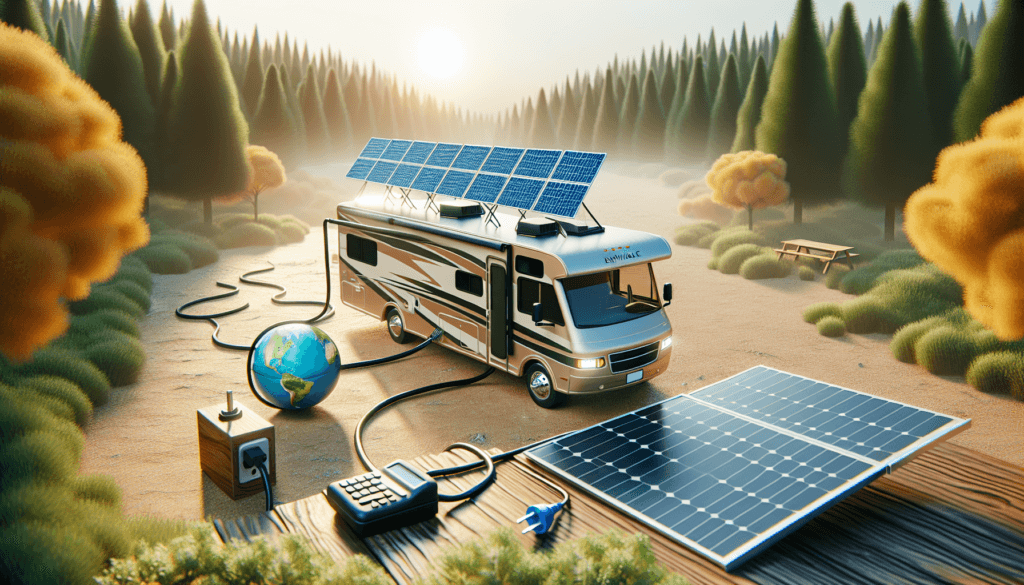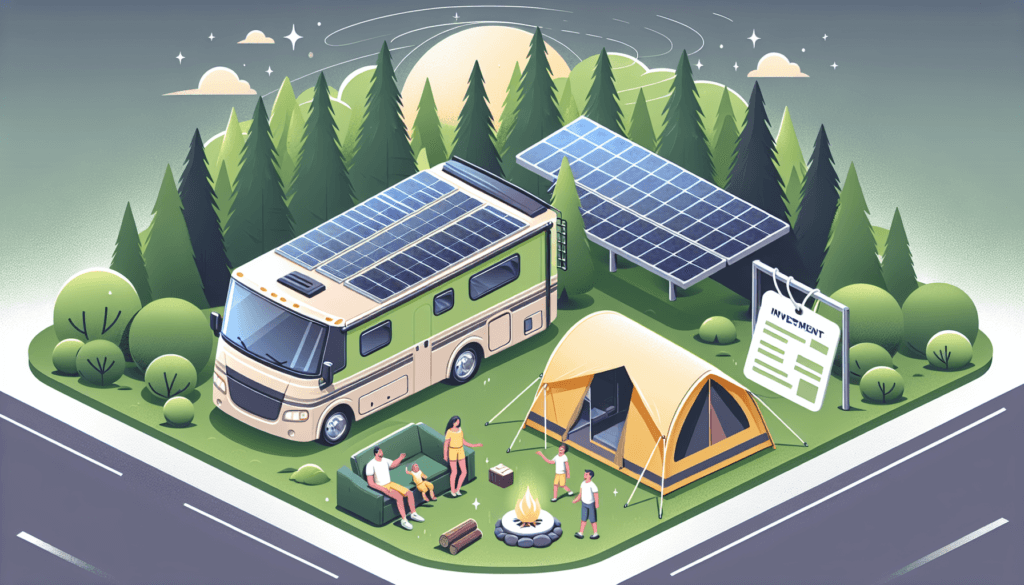Are you an avid RV camper searching for a way to harness the power of the sun during your trips? Look no further! In this article, we will explore the world of RV camping solar panels and evaluate whether they are truly worth the investment. Whether you’re concerned about the environmental impact, seeking independence from traditional power sources, or simply wanting to save on energy costs, we’ve got you covered with all the information you need to make an informed decision. So, buckle up and let’s discover if RV camping solar panels are the perfect addition to your outdoor adventures!

Pros of RV Camping Solar Panels
1.1 Energy Independence
One of the major advantages of installing solar panels on your RV is the energy independence it offers. When you have your own power source, you are not reliant on campgrounds or RV parks for electricity. This means that you can camp in remote areas without worrying about access to power. You can have all the comforts of home, such as running appliances and charging devices, while still enjoying the freedom of the great outdoors.
1.2 Environmental Benefits
Another compelling reason to consider RV camping solar panels is the positive impact they have on the environment. By harnessing the power of the sun, you reduce your reliance on fossil fuels and contribute to a cleaner and greener planet. Solar panels produce electricity without emitting harmful greenhouse gases or other pollutants. Choosing solar energy for your RV contributes to a more sustainable future for generations to come.
1.3 Cost Savings
RV camping solar panels can also provide significant cost savings in the long run. While the initial investment may seem steep, the money saved on electricity bills over time can offset this expense. With solar panels, you can generate your own electricity for free, reducing or eliminating the need to rely on campground electricity hook-ups or running a generator. This not only saves you money but also reduces the environmental impact of traditional power sources.
1.4 Quiet Operation
One often overlooked advantage of RV camping solar panels is their quiet operation. Unlike generators, which can be noisy and disruptive, solar panels silently generate electricity without creating any disturbance. This allows for a peaceful camping experience, free from the constant hum of a generator. Not only does this enhance the overall camping experience, but it also fosters a more harmonious relationship with your fellow campers and the natural surroundings.
Cons of RV Camping Solar Panels
2.1 Initial Investment
While there are many benefits to installing solar panels on your RV, it is important to consider the initial investment required. The cost of purchasing and installing solar panels can be significant, especially if you opt for high-quality and efficient systems. However, it is important to remember that this cost can be recouped over time through savings on electricity bills and the enhanced flexibility and independence solar panels offer.
2.2 Limited Power Generation
Another potential drawback of RV camping solar panels is their limited power generation capacity. Solar panels rely on sunlight to produce electricity, and their efficiency can vary depending on weather conditions and the specific location of your RV. While advancements in technology have made solar panels more efficient, it may still be necessary to supplement with alternative power sources, such as a generator or battery, during periods of low sunlight or high energy consumption.
2.3 Dependence on Sunlight
One of the inherent limitations of RV camping solar panels is their dependence on sunlight. Cloudy or overcast days can impact the amount of electricity generated, especially in comparison to bright, sunny days. This reliance on sunlight means that solar panels may not be the most reliable power source in all weather conditions or geographic locations. However, proper planning and understanding of your energy needs can help mitigate this limitation.
2.4 Installation and Maintenance Challenges
Installing and maintaining RV camping solar panels can also present challenges. The installation process requires careful consideration of the available roof space on your RV and ensuring the panels are securely mounted. Additionally, proper maintenance, including regular cleaning and inspection, is necessary to ensure optimal performance. While these challenges can be overcome with proper research and planning, they are important factors to consider before deciding to invest in solar panels for your RV.
Factors to Consider for RV Camping Solar Panels
3.1 Energy Needs
Before installing solar panels on your RV, it is essential to evaluate your energy needs. Consider the appliances and devices that will be powered by solar energy and calculate the total wattage required. This will help determine the size and capacity of the solar panel system you need to meet your energy demands.
3.2 Available Roof Space
The available roof space on your RV will also impact the type and number of solar panels you can install. Measure the dimensions of your roof and consider any obstacles, such as roof vents or air conditioning units, that may limit the available space. This will help determine the maximum size and configuration of the solar panel system that can be accommodated.
3.3 Vehicle Type
The type and size of your RV may also influence the suitability of solar panels. Smaller RVs may have limited roof space and electrical systems, which could impact the feasibility of installing a solar panel system. Additionally, the weight of the solar panels and associated equipment should be taken into consideration to ensure it is within the safe load capacity of your RV.
3.4 Travel Habits
Your travel habits and camping destinations should also be considered when evaluating the viability of RV camping solar panels. If you primarily camp in sunny regions or spend extended periods off-grid, solar panels can be a valuable investment. However, if you frequently visit shaded or cloudy areas or rely on full-hookup campgrounds, the benefits of solar panels may be less significant.
Types of RV Solar Panels
4.1 Monocrystalline Solar Panels
Monocrystalline solar panels are known for their high efficiency and sleek appearance. They are made from a single crystal structure, which allows them to convert sunlight into electricity more efficiently than other types of solar panels. Monocrystalline panels are typically more expensive than other options but are a popular choice for RV owners looking for maximum power generation in limited space.
4.2 Polycrystalline Solar Panels
Polycrystalline solar panels are made from multiple crystalline structures, which makes them easier and more cost-effective to produce. While they are slightly less efficient than monocrystalline panels, polycrystalline panels still offer a good balance of performance and affordability. They are a popular choice for RV owners looking for a cost-effective solar panel option.
4.3 Amorphous Silicon Solar Panels
Amorphous silicon solar panels use a non-crystalline form of silicon, which makes them flexible and lightweight. They are less efficient than crystalline panels but can be a suitable option for RV owners with limited roof space or irregular surfaces. Amorphous silicon panels are also more shade-tolerant, making them a good choice for RVers who frequently camp in partially shaded areas.

Calculating Energy Needs for RV Camping
5.1 Determining Daily Energy Consumption
To calculate your daily energy consumption, make a list of all the appliances and devices that will be powered by solar energy. Determine the wattage ratings for each item and estimate the number of hours each item will be used per day. Multiply the wattage by the hours of use to calculate the total watt-hours consumed daily.
5.2 Calculating Battery Capacity
To determine the battery capacity required, consider the number of days you wish to be self-sufficient without access to external power sources. Multiply the daily energy consumption calculated in the previous step by the number of days, and add a buffer to account for battery inefficiencies. This will give you an estimate of the minimum battery capacity needed.
5.3 Determining Solar Panel Wattage
To size your solar panel system, divide the total daily watt-hours calculated in step 5.1 by the average daily sunlight hours in your location. This will give you the minimum solar panel wattage needed to generate enough electricity to meet your energy consumption. It is recommended to add additional capacity to account for potential variations in sunlight intensity and for future energy needs.
Factors Affecting Solar Panel Performance
6.1 Sunlight Intensity and Duration
The intensity and duration of sunlight directly impact the performance of RV camping solar panels. Bright, direct sunlight will generate more electricity compared to cloudy or overcast conditions. Additionally, longer daylight hours during certain seasons can contribute to increased power generation. Understanding the typical weather patterns and sunlight exposure in your camping destinations can help set realistic expectations for your solar panel system’s performance.
6.2 Panel Tilt and Orientation
The tilt and orientation of solar panels also play a role in their performance. Ideally, panels should be angled to capture the maximum amount of sunlight throughout the day. This angle should be adjusted seasonally to optimize performance. The direction the panels face, whether it be towards the south in the Northern Hemisphere or north in the Southern Hemisphere, also affects their ability to harness sunlight effectively.
6.3 Temperature and Shading
High temperatures can negatively impact the efficiency of solar panels, causing a decrease in power generation. It is important to consider potential shading from nearby structures, trees, or even your own RV, as shadows can significantly reduce the output of your solar panels. Proper placement and shading analysis can help mitigate these issues and maximize the performance of your solar panel system.

Choosing the Right RV Camping Solar Panel System
7.1 Assessing Power Requirements
To choose the right RV camping solar panel system, it is crucial to accurately assess your power requirements. Consider the appliances and devices you will be using, their power ratings, and the estimated hours of use per day. This information will help determine the size and capacity of the solar panel system needed to meet your energy demands.
7.2 Evaluating Solar Panel Efficiency
Solar panel efficiency is an important factor to consider when choosing an RV camping solar panel system. Higher efficiency panels can generate more electricity in the same amount of space compared to lower efficiency panels. Take into account the space available on your RV’s roof and the desired power output to select a system with an appropriate level of efficiency.
7.3 Considering Available Roof Space
The available roof space on your RV will dictate the size and configuration of the solar panel system you can install. Measure the dimensions of your roof and consider any obstacles, such as roof vents or air conditioning units, that may limit the available space. This will help determine the maximum size and number of solar panels that can be accommodated.
7.4 Budgeting for Installation Costs
In addition to the cost of the solar panel system itself, it is important to budget for installation costs. Depending on the complexity of the installation, you may need to hire a professional to ensure proper mounting and wiring. Factor in the cost of labor, as well as any additional equipment or components required for a safe and reliable installation.
7.5 Researching Customer Reviews
Before making a final decision on an RV camping solar panel system, take the time to research customer reviews and feedback. Look for reliable sources of information, such as online forums or reputable RVing websites, to gather insights from other RV owners who have installed solar panels. Their experiences and recommendations can provide valuable guidance in choosing the right solar panel system for your needs.
Installation and Maintenance of RV Camping Solar Panels
8.1 Mounting the Solar Panels
Properly mounting the solar panels is crucial to their performance and longevity. Follow the manufacturer’s instructions and ensure the panels are securely attached to your RV’s roof. Use appropriate mounting brackets or adhesive materials specifically designed for RVs to prevent damage to the roof, and ensure the panels are positioned for optimal sunlight exposure.
8.2 Wiring and Inverter Installation
Correct wiring and inverter installation are essential to the safe and efficient operation of your RV camping solar panel system. Use properly sized cables and connectors, and ensure they are installed and routed in a way that minimizes potential damage or interference. Install a solar charge controller to regulate the flow of electricity between the panels and the batteries, protecting them from overcharging or damage.
8.3 Battery Maintenance
Regular battery maintenance is necessary to ensure the longevity and performance of your RV camping solar panel system. Follow the manufacturer’s guidelines for maintenance, including checking fluid levels, cleaning terminals, and monitoring battery health. Consider investing in a battery monitor or management system to accurately monitor battery charge levels and ensure efficient energy usage.
8.4 Cleaning and Maintenance of Solar Panels
Keep your solar panels clean and free from debris to maintain optimal performance. Regularly inspect the panels for any signs of damage or wear and clean them using a soft cloth or sponge with a mild, non-abrasive cleanser. Avoid using harsh chemicals or abrasive materials that could scratch or damage the panels. Perform routine maintenance to ensure proper functioning and address any issues promptly.

RV Camping Solar Panel Tips and Best Practices
9.1 Optimal Sun Exposure
To maximize the performance of your RV camping solar panel system, prioritize optimal sun exposure. Park your RV in areas with unobstructed sunlight, such as open fields or campsites without tree cover. Regularly adjust the angle of your panels to optimize their position relative to the sun’s rays throughout the day. This proactive approach will ensure you make the most of the available sunlight for power generation.
9.2 Energy Conservation
While solar panels provide a renewable source of energy, it is still important to practice energy conservation to prolong the life of your battery and maximize the efficiency of your system. Use energy-efficient appliances and devices, turn off electronics when not in use, and limit excessive energy consumption. Small changes in behavior and habits can have a significant impact on your overall energy consumption and allow your solar panel system to meet your needs more effectively.
9.3 Investing in Quality Components
When it comes to RV camping solar panels, investing in quality components is essential for long-term performance and reliability. Opt for reputable brands with a proven track record of producing high-quality solar panels. While these components may come with a higher price tag, their durability and efficiency will pay off in the long run.
9.4 Regular System Inspections
Perform routine inspections of your RV camping solar panel system to identify any potential issues early on. Check the wiring, connections, and mounting hardware for signs of wear or damage. Monitor the performance of your solar panels, batteries, and inverters to ensure they are functioning as expected. By proactively addressing any issues, you can prevent further damage and optimize the lifespan of your system.
9.5 Proper Storage and Transportation
When not in use, properly store and protect your RV camping solar panels. Keep them in a clean and dry environment to prevent damage from exposure to moisture or extreme temperatures. During transportation, secure the panels to prevent them from shifting or sustaining damage during rough roads or inclement weather. Proper care and maintenance during storage and transportation will prolong the life and performance of your solar panels.
Conclusion
RV camping solar panels offer numerous benefits, from energy independence and environmental sustainability to cost savings and quiet operation. However, it is important to carefully consider the factors that will impact the feasibility and performance of a solar panel system on your RV. By evaluating your energy needs, available roof space, vehicle type, and travel habits, you can make an informed decision when selecting the type and size of solar panels that best suit your needs. Proper installation, maintenance, and adherence to best practices will ensure the longevity and optimal performance of your RV camping solar panel system. With the right research and planning, RV camping solar panels can greatly enhance your camping experience and provide a reliable and eco-friendly source of power wherever your adventures take you.



